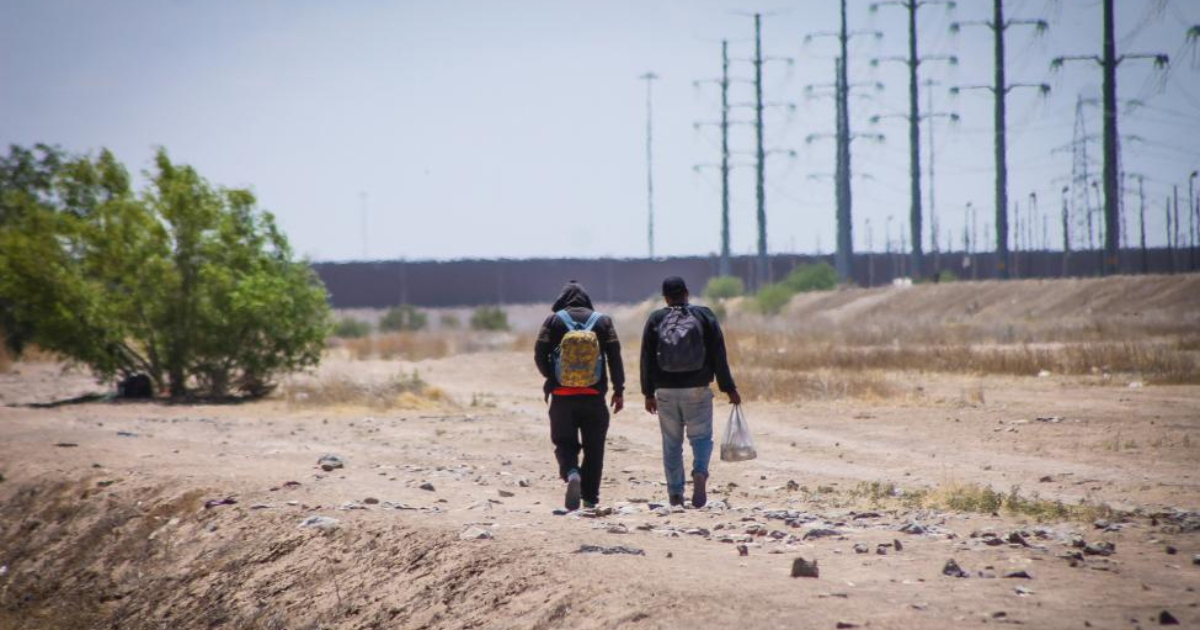
President Joe Biden signed a series of executive actions that prevent irregular migrants from receiving asylum in the United States after crossing the border illegally.
The White House pointed out in an official statement that "actions will be in effect when the high levels of encounters with illegal migrants at the Southern Border exceed the ability to generate timely consequences, as is the case on June 4th."
They claim that the measures approved by Biden will make it easier for immigration officers to expel those migrants who do not have a legal basis to stay in the United States. Another goal is to reduce the burden on Border Patrol agents.
The Biden Administration warns that Congress still needs to act to resolve the immigration issue at the Mexico border, as the actions approved by the president do not provide the necessary personnel or funds to secure the situation.
Executive actions of the Biden-Harris Administration
The first action is to prohibit immigrants who cross the southern border illegally from receiving asylum.
President Biden issued a proclamation under sections 212(f) and 215(a) of the Immigration and Nationality Act suspending the entry of non-citizens who illegally cross the border.
It is accompanied by a final provisional rule from the Departments of Justice and Homeland Security, which restricts asylum for non-citizens. It will be in effect when the southern border is overwhelmed and will enable immigration officials to quickly expel individuals who do not have a legal basis to remain in the United States.
The Biden administration clarifies that these actions are not permanent. They will be suspended when the number of migrants crossing the border between ports of entry is sufficiently low for the U.S. system to safely and effectively manage border operations.
In addition, they include humanitarian exceptions similar to those in the bipartisan border agreement announced in the Senate, such as those referring to cases of unaccompanied children and victims of trafficking.
Recent actions to secure the border in the U.S.
1. Strengthening the asylum selection process
The Department of Homeland Security published a proposed rule to ensure that migrants who pose a risk to public or national security are expelled as quickly as possible in the process, rather than remaining in prolonged and expensive detention before their expulsion.
2. Actions to resolve immigration cases more quickly
The Department of Justice and the Department of Homeland Security have launched a recent arrivals docket to expedite the resolution of cases of migrants trying to cross between ports of entry at the southern border in violation of the law.
The Department of Justice will be able to quickly handle these cases, and the Department of Homeland Security will be able to expel people who do not have a legal basis to stay in the United States sooner and grant protection to those with valid claims.
3. Visas revoked for CEOs and government officials who benefit from immigrants arriving illegally in the U.S.
The Department of State imposed visa restrictions on executives of several Colombian transportation companies that profit from migrant trafficking by sea. This action takes strong measures against companies that help facilitate illegal entry into the United States.
The Department of State also imposed visa restrictions on over 250 members of the Nicaraguan government, non-governmental actors, and their immediate family members, for their role in supporting the Ortega-Murillo regime, which is selling transit visas to migrants inside and outside the West.
The Department of State revoked visas of charter airline executives for similar actions.
4. Enhanced efforts to dismantle human trafficking and support immigration processes
The Departments of State and Justice launched an initiative called "Rewards against Smuggling," designed to dismantle the leadership of human trafficking organizations that bring migrants through Central America and the southern U.S. border.
The initiative will offer financial rewards for information leading to the identification, location, arrest, or conviction of the main perpetrators of significant human trafficking activities in the region.
The Department of Justice will seek new and increased sanctions against human traffickers to properly address the seriousness of their criminal behavior and the human misery it causes.
This department will partner with the Department of Homeland Security to assign additional prosecutors and support staff to increase immigration-related prosecutions in critical federal border prosecutors' offices.
Additional special assistant US attorneys from the DHS will be deployed in different offices; support staff will be assigned to critical offices, including DOJ attorneys in various border districts, and they may partner with federal agencies to identify additional resources to combat these crimes.
5. Improve the enforcement of the immigration law
The Department of Homeland Security has deployed agents to the southern border and is referring a record number of individuals for expedited removal.
The Department of Homeland Security is operating more repatriation flights per week than ever before. Last year, DHS expelled or returned over 750,000 people.
Seizure of fentanyl
The President has added 40 drug detection machines at entry points to disrupt the smuggling of fentanyl into US territory.
The Biden administration ensures that it is working with the Mexican government on these delicate issues at the border.
In the statement, they mentioned that the Department of Justice recently extradited Néstor Isidro Pérez Salaz, known as "El Nini," from Mexico to the United States to face charges for his role in the illicit trafficking of fentanyl and human rights abuses.
What do you think?
COMMENTFiled under: